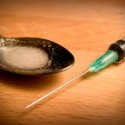To help, or at least do no harm
Canada’s Health Minister urgently needs an education in harm reduction. Announcing his intention to shut down Insite, the supervised injection facility serving drug addicts in Vancouver’s Downtown Eastside, Tony Clement told the House of Commons health committee that “supervised injection is not medicine; it does not heal the person addicted to drugs.”
Mr. Clement got one thing right: Supervised injection does not heal addiction. It is, however, completely in line with accepted medical practice.
Consider other areas of medicine. Prescribing inhalant medication to open airways and reduce lung inflammation in smokers also does not “heal” nicotine addiction: It only saves lives and improves quality of life. Similarly, quadruple bypass surgery in overstressed type-A business executives does not heal workaholism; insulin does not cure people whose eating patterns and sedentary habits have triggered diabetes, and intestinal bypass surgery in relief of morbid obesity does not cure food addiction. But all of these medical interventions are harm-reduction measures.
Harm reduction is often seen as being inimical to the ultimate purpose of helping addicts to transcend their habits and to heal. People believe it “coddles” addicts, enabling them to continue their destructive ways. It’s also considered to be the opposite of abstinence, which many regard as the only legitimate goal of addiction treatment.
Such a distinction is artificial. The issue in medical practice is always how best to help a patient. If a cure is possible and probable without doing greater harm, then cure is the objective. When it isn’t – and in most chronic medical conditions cure is not the expected outcome – the physician’s role is to help the patient with the symptoms and to mitigate the harm done by the disease process.
In rheumatoid arthritis, for example, one aims to prevent joint inflammation and bone destruction and, in all events, to reduce pain. In other words, harm reduction means making the lives of afflicted human beings more bearable, more worth living. That is also a goal of harm reduction in the context of addiction.
Given the chronic and relapsing nature of injection drug use among hardcore addicts, cure is not often achieved. That leaves us with the need to reduce the depredations of the condition on the afflicted person and that’s what supervised injection does: It minimizes disease transmission and affords first-line access to health care.
As the physician at Onsite, the detox facility attached to Insite, I can assure Mr. Clement that staff do their utmost to steer clients toward abstinence and recovery. Many people have entered recovery programs owing to their contact with health personnel during supervised injection. For all too many addicts, Insite is their first exposure to a caring, compassionate and non-judgmental model of medical care.
Mr. Clement told the Commons health committee that “government-sponsored supervised injection sends a very mixed message to young people who are contemplating the use of illicit drugs.”
Does the minister have any evidence for that astonishing assertion? No one “contemplates” addiction and no one becomes addicted because of such “messages.” The chronic condition of severe substance addiction is caused, in most cases, by the distorting effects of early childhood abuse or stress on the developing brain, often in the context of multigenerational trauma and social dislocation.
Much more could be done – and much more needs to be done – to prevent addiction, and much more to cure it.
Harm reduction programs such as Insite are a small but necessary step, a practical way for our health-care system to extend compassionate treatment to those who most need it.
Gabor Maté is author of In The Realm of Hungry Ghosts: Close Encounters With Addiction.
________
source: The Globe and Mail


